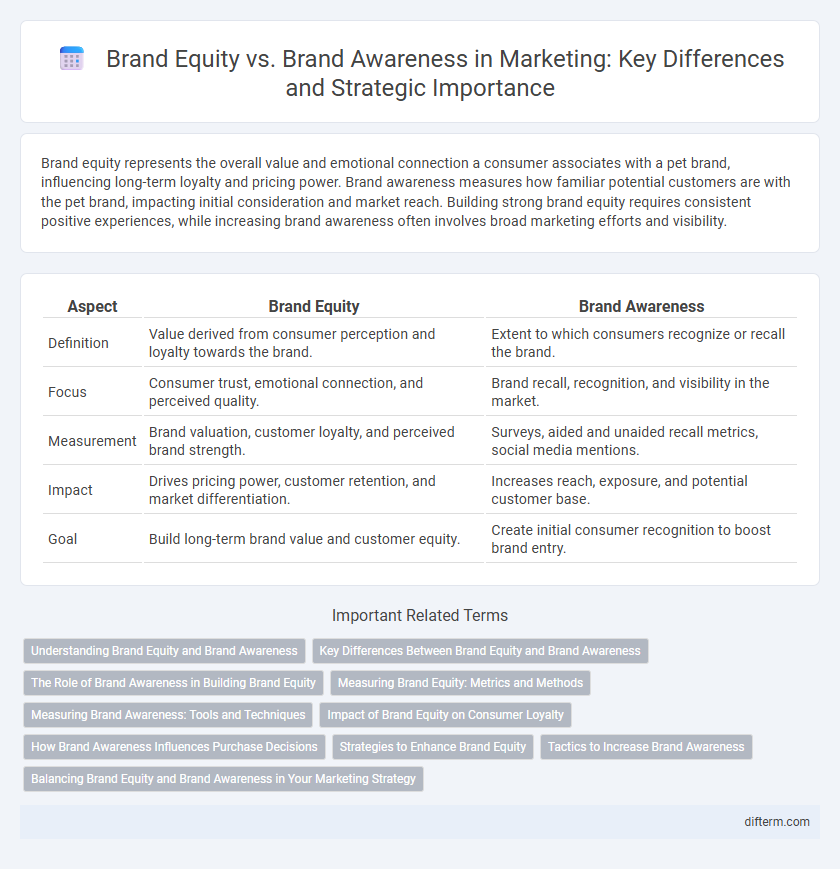Brand equity represents the overall value and emotional connection a consumer associates with a pet brand, influencing long-term loyalty and pricing power. Brand awareness measures how familiar potential customers are with the pet brand, impacting initial consideration and market reach. Building strong brand equity requires consistent positive experiences, while increasing brand awareness often involves broad marketing efforts and visibility.
Table of Comparison
| Aspect | Brand Equity | Brand Awareness |
|---|---|---|
| Definition | Value derived from consumer perception and loyalty towards the brand. | Extent to which consumers recognize or recall the brand. |
| Focus | Consumer trust, emotional connection, and perceived quality. | Brand recall, recognition, and visibility in the market. |
| Measurement | Brand valuation, customer loyalty, and perceived brand strength. | Surveys, aided and unaided recall metrics, social media mentions. |
| Impact | Drives pricing power, customer retention, and market differentiation. | Increases reach, exposure, and potential customer base. |
| Goal | Build long-term brand value and customer equity. | Create initial consumer recognition to boost brand entry. |
Understanding Brand Equity and Brand Awareness
Brand equity represents the intrinsic value and perception consumers have toward a brand, influenced by factors such as brand loyalty, quality, associations, and awareness. Brand awareness measures how familiar consumers are with a brand name and its products, serving as the foundation for building brand equity. Understanding the distinction between brand equity and brand awareness helps marketers develop strategies that not only increase recognition but also foster deeper customer relationships and long-term brand value.
Key Differences Between Brand Equity and Brand Awareness
Brand equity represents the overall value and perception a brand holds in the minds of consumers, influenced by factors like customer loyalty, perceived quality, and brand associations. Brand awareness measures the extent to which consumers recognize or recall a brand name, indicating the brand's visibility but not necessarily the depth of consumer connection. The key difference lies in brand equity driving long-term brand strength and financial performance, while brand awareness serves as an initial step toward building that equity.
The Role of Brand Awareness in Building Brand Equity
Brand awareness is a critical foundation in building brand equity, as it establishes consumer recognition and familiarity with a brand's identity and offerings. High brand awareness increases the likelihood of customer trust and preference, directly influencing perceived quality and brand loyalty--the key components of brand equity. Consistent exposure through effective marketing campaigns amplifies brand recall, reinforcing positive brand associations that enhance overall market value.
Measuring Brand Equity: Metrics and Methods
Measuring brand equity involves assessing customer perceptions, loyalty, and overall brand value through metrics such as brand recall, brand recognition, and net promoter score (NPS). Methods like brand audits, customer surveys, and financial analysis--focusing on market share, price premium, and brand profitability--provide comprehensive insights into brand strength. Combining qualitative and quantitative data enables marketers to evaluate the true impact of brand equity on business performance effectively.
Measuring Brand Awareness: Tools and Techniques
Measuring brand awareness involves tools like surveys, social media analytics, and Google Trends to evaluate consumer recognition and recall. Techniques such as aided and unaided brand recall tests provide quantitative data on brand visibility and consumer perception. Leveraging digital metrics including website traffic, search volume, and engagement rates helps marketers accurately assess the effectiveness of brand awareness campaigns.
Impact of Brand Equity on Consumer Loyalty
Brand equity significantly influences consumer loyalty by creating a strong emotional connection and trust between the brand and its customers, leading to repeat purchases and long-term commitment. High brand equity enhances perceived value, making consumers more likely to choose the brand over competitors despite price differences. This increased loyalty translates into sustained revenue growth and higher market share, emphasizing the critical role of brand equity beyond mere brand awareness.
How Brand Awareness Influences Purchase Decisions
Brand awareness significantly shapes purchase decisions by increasing consumer recognition and recall of a brand, which builds trust and reduces perceived risk. High brand awareness creates a mental shortcut that makes consumers more likely to choose familiar brands over unknown competitors during the buying process. Marketers leverage brand awareness to enhance brand equity, ultimately driving customer preference and loyalty.
Strategies to Enhance Brand Equity
Enhancing brand equity requires consistent delivery of high-quality products and services that meet customer expectations, fostering strong emotional connections through authentic storytelling and personalized experiences. Implementing loyalty programs and engaging in strategic partnerships can significantly increase perceived value and trust. Measuring customer perceptions alongside market performance ensures strategies align with brand promise and strengthen long-term brand equity.
Tactics to Increase Brand Awareness
Focusing on tactics to increase brand awareness involves leveraging social media campaigns, influencer partnerships, and targeted content marketing to reach a broader audience. Utilizing search engine optimization (SEO) and pay-per-click (PPC) advertising can significantly enhance online visibility and drive traffic to brand touchpoints. Consistent engagement through community building and interactive experiences fosters recognition, thereby strengthening the foundation for long-term brand equity.
Balancing Brand Equity and Brand Awareness in Your Marketing Strategy
Balancing brand equity and brand awareness in your marketing strategy requires prioritizing consistent messaging that reinforces brand values while expanding audience reach through targeted campaigns. Strong brand equity enhances customer loyalty and premium pricing, whereas brand awareness drives initial recognition and consideration in competitive markets. Effective strategies integrate both metrics, leveraging analytics to optimize investment and maximize long-term brand value.
Brand Equity vs Brand Awareness Infographic

 difterm.com
difterm.com